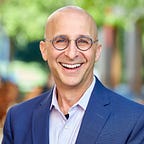Digital Was the Spark, but Educational Disruption Was the Fire — Dan Rosensweig, CEO Chegg
The Industrialist’s Dilemma — January 23, 2020
Every now and again we end up with a classroom discussion that takes unexpected twists and turns. For five years in our course we have covered how the blend of digital and physical products is reshaping industries and companies that are well established and have been around for decades or even hundreds of years. But our class with Dan Rosensweig brought these issues unbelievably close to home, as the session quickly vaulted from the impact of digital technologies on higher education to the more fundamental discussion on the role of higher education in society. Before we knew it our class veered into the area of an existential discussion of universities and their purpose in society. And Rosensweig was the perfect guest to push our conversation from the “how” of disruption to the “why” of its implications.
It Started with Digital…
Chegg began as a platform for renting textbooks at universities, with the belief that the publishing industry was taking advantage of young people who needed textbooks but did not have options on how best to keep costs down. Over time Chegg has added a variety of educational services such as tutoring sessions, writing support, videos for step-by-step instructions on how to solve math problems, internship matching, as well as other services to support students. The company has over six million paying customers and last year offered over 450,000 personalized tutoring sessions. In the words of Rosensweig, the company serves the people who need it the most (students), and the implementation of digital capabilities is what has enabled time shifting of education, the lowest cost model available for supporting students, and an unlimited number of seats for any class topic. Rosensweig asserted that Chegg is the largest educational institution in the United States; they just don’t grant degrees.
But the Implications Are Societal…
The impact of this disruption became more lively when the discussion turned to the rising student debt crisis and how the nature of what is the “average” student in a university is no longer what it used to be. With over $1.5 trillion in student debt across the United States, the issue has become a staggering burden on young people just as they begin their professional lives. And as pointed out by Rosensweig, every Fall over 20 million students enroll in four-year universities, of which over 40% won’t graduate (yet will still accrue an average of over $9,000 in debt), and the remaining students who will graduate will have over $37,000 in debt when they finally receive their diplomas. As Rosensweig also highlighted, the average person in a college or university is 26 years old and has a child — not the stereotype of a single individual between the ages of 18 and 22 living in a dorm or an apartment on campus.
Aside from discussing how digital innovation both lowers costs and also expands the flexibility for continued education (which the students in our class readily agreed will be an ongoing requirement in a world of continued technological change), it was pointed out that digital technologies enable benefits in education by helping to provide unprecedented personalization of individual learning needs, and simultaneously also allow students not to have to choose between “earning or learning.” In a world which demands individuals to receive both an education and somehow to gain financial sufficiency, services offered by companies like Chegg can serve those who need them the most: the students.
Which Left Us Asking, “What Is the Role of Higher Education?”
Perhaps the most intense part of the discussion revolved around the purpose of higher education: is it simply a path to get a better job, or are there broader purposes that it serves for society? There was broad disagreement across the room; some asserted that with the rising cost of higher education, it has become increasingly important for schools to train people to get a job once they graduate. Others believed that universities can and should be a time for people to consider broader issues about society, governments, the role of ethics, and other issues that have vexed our species for thousands of years.
At the extreme, if the main purpose of higher education is to help students get jobs, then schools are simply vocational training institutions — and the only question is what vocation a student is studying to enter. At the other extreme, if the purpose of a university is to enable young adults to develop opinions and to think critically, it runs the risk of becoming irrelevant in a rapidly changing world and where the cost of such a luxury is out of reach for most.
Rosensweig postulated an interesting insight; he shared that while there will always be some institutions that allow some in our society to wrestle with the more intangible issues that we face as humans, he asserted that Chegg’s role is to help those in society who don’t have the time, luxury or money to do that, but must still obtain a high quality education at an affordable price. And the ability for a company like Chegg to do this is through the delivery of content, services, software, data and knowledge using digital tools that were previously not unavailable.
And by focusing on those customers who need these services, he believes that Chegg can have as large of an impact on higher education as anyone else in the country.
